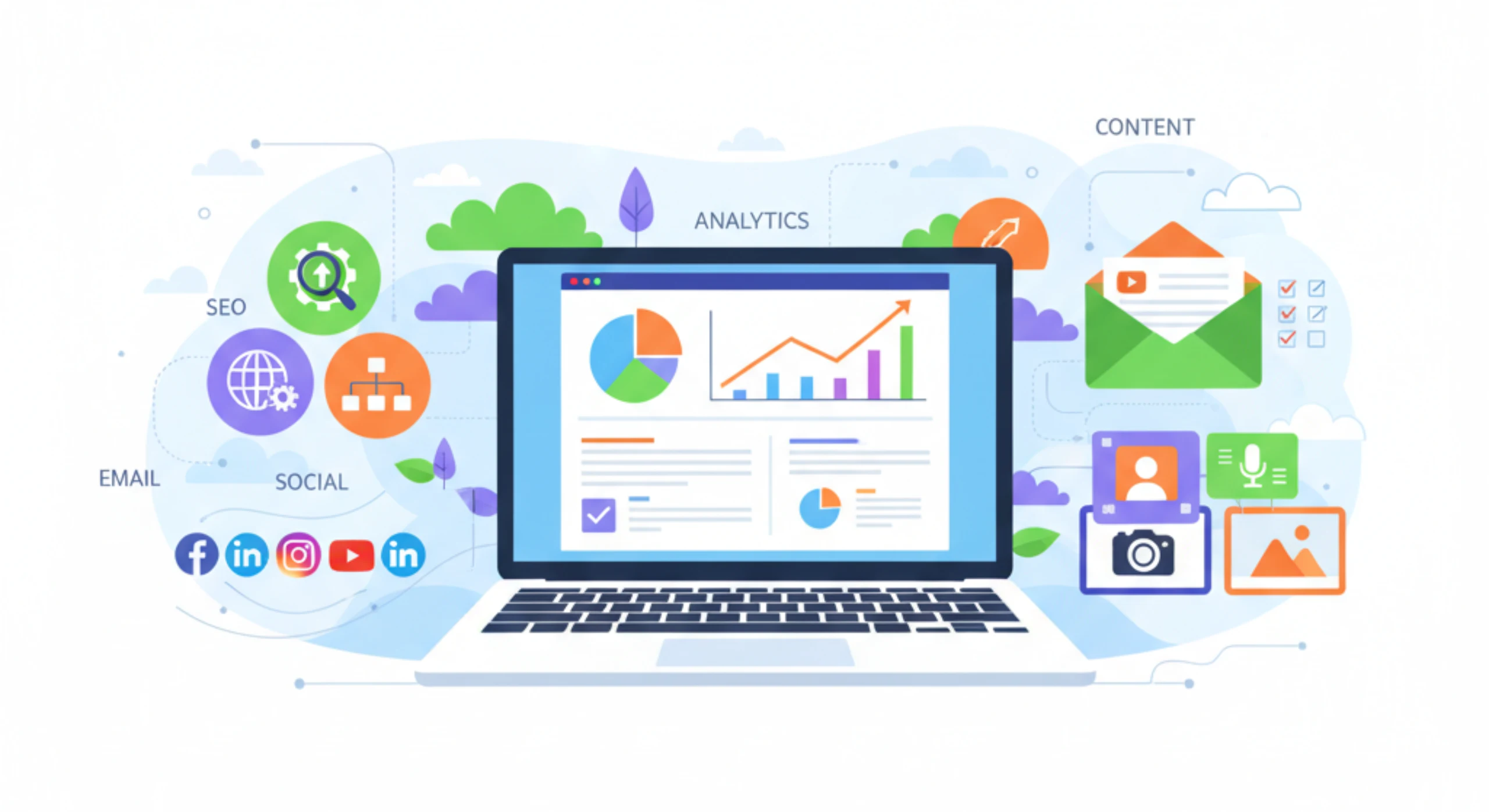15 Effective Tools for Digital Marketing Every Business Needs

The way businesses market themselves has changed dramatically, without the right tools for digital marketing, even the best campaigns can struggle to stay afloat. Whether you are a startup, a small business, or managing a large company, leveraging the right tools for digital marketing can save time, boost productivity, and significantly improve your results.
Digital marketing encompasses many areas – SEO, social media, email campaigns, content creation, analytics, and paid ads. Each of these areas requires specialised software to simplify tasks, measure performance, and ensure campaigns deliver the desired outcomes. In this blog, we will explore 15 must-have tools and software that can help businesses succeed in the digital space.
Why are tools essential for Digital Marketing
Many businesses attempt to manage all marketing activities manually, using spreadsheets and guesswork. This approach is time-consuming and often inaccurate. Using the right tools helps businesses:
- Automate repetitive tasks like posting on social media or sending emails.
- Measure and analyse performance accurately.
- Optimise campaigns based on real-time data.
- Improve collaboration across teams.
Simply put, the right tools allow marketers to work smarter, not harder, and focus on strategy rather than getting bogged down in operations.
1. Google Analytics – Understanding Your Audience
Google Analytics is a must-have tool for tracking website performance. It provides insights into visitor behaviour, traffic sources, conversion rates, and user demographics.
Why It Matters: Understanding your audience helps in designing campaigns that resonate with them. You can identify which channels drive traffic, which pages are performing well, and where improvements are needed.
2. SEMrush – SEO and Competitor Analysis
SEMrush is a powerful tool for SEO, keyword research, and competitor analysis. It helps you identify opportunities, track rankings, and optimise your website for search engines.
Why It Matters: SEO is a critical component of digital marketing, and SEMrush ensures you stay ahead of competitors by targeting the right keywords and improving your website’s visibility.
3. Ahrefs – Backlink and Content Insights
Ahrefs is another popular SEO tool that focuses on backlinks, content analysis, and competitor monitoring. It helps you find opportunities to improve your content strategy and grow organic traffic.
Why It Matters: Strong backlinks and high-quality content are essential for search engine rankings. Ahrefs provides actionable insights to enhance your SEO efforts.
4. Canva – Creative Content Made Easy
Creating engaging visuals is vital for social media, blogs, and email campaigns. Canva is a user-friendly graphic design tool that allows even non-designers to create professional graphics.
Why It Matters: Visual content grabs attention and improves engagement. Canva saves time and reduces dependence on professional designers for everyday content.
5. Buffer – Social Media Scheduling
Buffer is a social media management tool that allows scheduling posts across multiple platforms like Facebook, Instagram, LinkedIn, and Twitter.
Why It Matters: Consistency is key in social media marketing. Buffer helps businesses plan and automate posts, ensuring a regular online presence without constant manual effort.
6. Mailchimp – Email Marketing Automation
Email marketing remains one of the most effective channels for lead nurturing and conversions. Mailchimp provides tools for creating campaigns, automating sequences, and tracking performance.
Why It Matters: Automated and personalised email campaigns improve open rates, engagement, and sales, making it easier to maintain customer relationships.
7. HubSpot – All-in-One Marketing Platform
HubSpot combines CRM, email marketing, social media management, and analytics in one platform. It is ideal for businesses looking for an integrated solution.
Why It Matters: Centralising marketing activities saves time, improves coordination, and ensures better tracking of leads and conversions.
8. Google Ads – Paid Advertising Tool for Digital Marketing
Google Ads is essential for running paid search and display campaigns. It allows targeting based on keywords, location, interests, and user behaviour.
Why It Matters: Paid campaigns can deliver instant traffic and leads when executed strategically. Google Ads offers detailed analytics to optimise campaigns for maximum ROI.
9. Hootsuite – Comprehensive Social Media Management
Hootsuite is another social media management tool that supports scheduling, monitoring, and analytics. It also allows teams to collaborate efficiently.
Why It Matters: Monitoring social conversations and engagement is critical for brand reputation and timely responses. Hootsuite simplifies this process for busy teams.
10. Trello – Organise Your Marketing Projects
Trello is a project management tool that uses boards, lists, and cards to organise tasks and workflows. It’s particularly useful for marketing teams managing multiple campaigns.
Why It Matters: Organised workflows improve efficiency, reduce confusion, and ensure campaigns are delivered on time.
11. BuzzSumo – Content Research and Trends
BuzzSumo helps marketers discover trending topics, top-performing content, and influencers in their niche.
Why It Matters: Creating content around trending topics increases the chances of engagement and shares. BuzzSumo ensures your content strategy is data-driven and relevant.
12. Grammarly – Error-Free Tool For Digital Marketing
Grammarly is a writing assistant that checks grammar, spelling, tone, and clarity. It is essential for writing blogs, emails, and social media posts.
Why It Matters: Error-free and professional content improves credibility and readability, ensuring your brand maintains a polished image online.
13. Hotjar – User Behaviour Insights
Hotjar provides heatmaps, session recordings, and user feedback to understand how visitors interact with your website.
Why It Matters: Insights into user behaviour help optimise website design, improve navigation, and increase conversions.
14. CoSchedule – Marketing Calendar and Automation
CoSchedule helps plan, organise, and automate content marketing campaigns. It integrates with social media platforms and email marketing tools.
Why It Matters: A clear content calendar ensures consistency, reduces last-minute rush, and aligns marketing activities with business goals.
15. Google Data Studio – Visualise Your Data
Google Data Studio allows marketers to create interactive dashboards and reports by connecting multiple data sources like Google Analytics, Ads, and social platforms.
Why It Matters: Visualising data makes it easier to interpret results, identify trends, and present insights to stakeholders effectively.
How to Choose the Right Tools for Digital Marketing
While all these tools are valuable, not every business needs all of them. Here are some tips to select the best tools for digital marketing:
- Identify Your Goals: Are you focusing on SEO, social media, email marketing, or paid campaigns? Choose tools that align with your objectives.
- Budget Considerations: Some tools are free or freemium, while others require a subscription. Evaluate ROI before investing.
- Ease of Use: Tools should simplify work, not complicate it. Ensure your team can use them effectively.
- Integration: Tools that integrate with your existing platforms save time and improve efficiency.
- Scalability: Choose software that can grow with your business as your marketing needs evolve.
Final Thoughts
Using the right tools for digital marketing is no longer optional; it is essential for success. From SEO and content creation to social media, email marketing, and analytics, the right software saves time, improves efficiency, and helps businesses make data-driven decisions.
The 15 tools and software we have discussed – Google Analytics, SEMrush, Canva, Mailchimp, HubSpot, and others, cover almost every aspect of digital marketing. By leveraging these tools, businesses can streamline their processes, engage audiences more effectively, and achieve measurable results.
Whether you are a small business looking to grow or a large company aiming for higher ROI, adopting the right digital marketing tools will give you a competitive edge in today’s digital-first world. If you’re serious about turning your website into a real growth engine not just a digital brochure, Contact Ozrit for Digital Marketing.
